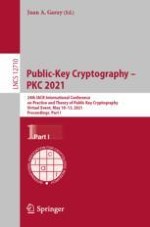2021 | OriginalPaper | Chapter
Compact Zero-Knowledge Proofs for Threshold ECDSA with Trustless Setup
Authors : Tsz Hon Yuen, Handong Cui, Xiang Xie
Published in: Public-Key Cryptography – PKC 2021
Publisher: Springer International Publishing
Activate our intelligent search to find suitable subject content or patents.
Select sections of text to find matching patents with Artificial Intelligence. powered by
Select sections of text to find additional relevant content using AI-assisted search. powered by
